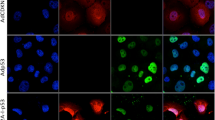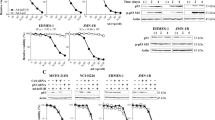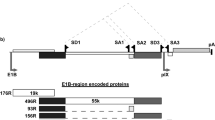Abstract
Replication-defective adenovirus vectors were generated in which the gene of interest (lacZ, luciferase or HSV-tk) is driven by the adenovirus major late promoter (MLP) or the human cytomegalovirus immediate–early gene promoter/enhancer (CMV). In vitro experiments with rat (II-45) and human (MERO 25) mesothelioma cell lines revealed that the CMV promoter was stronger than the MLP promoter regarding levels of expression of the luciferase reporter gene and ganciclovir (GCV) killing efficiency after tk gene transfer. Following administration of IG.Ad.CMV.lacZ recombinant adenovirus (Introgene, IG) into the pleural cavity of Fischer rats with established mesothelioma, a widespread distribution of infectious virus particles through the thorax contents was demonstrated. However, a relatively small proportion of tumor cells were transduced. Nevertheless, a strong tumor growth inhibition was observed following treatment with IG.Ad.CMV.TK recombinant adenovirus and GCV. Separate groups of rats inoculated on day 0 with 105 II-45 cells into the pleural cavity, received 7 × 109 infectious particles of IG.Ad. CMV.TK on day 1, day 2, day 4 or day 8. One day after virus administration, 25 mg/kg GCV or PBS (controls) was injected i.p. (intraperitoneally) twice daily. On day 15, all animals were killed. Significant tumor regression, equivalent to 5 log cell kill, occurred in the treated rats suggesting an impressive bystander effect. In a survival study, animals were treated 9 days after inoculation of 105 tumor cells with IG.Ad.CMV.TK and a 14 days course of GCV. This treatment prolonged symptom-free survival time from 19 days in the controls to 33 days in the treated group. These responses can be best explained by assuming continued tk expression in or around the tumor tissue during GCV treatment. Our results confirm and extend earlier findings with the same model and demonstrate the potential of the herpes simplex virus thymidine kinase suicide gene therapy as a local treatment for malignant mesothelioma.
This is a preview of subscription content, access via your institution
Access options
Subscribe to this journal
Receive 12 print issues and online access
$259.00 per year
only $21.58 per issue
Buy this article
- Purchase on Springer Link
- Instant access to full article PDF
Prices may be subject to local taxes which are calculated during checkout
Similar content being viewed by others
Author information
Authors and Affiliations
Rights and permissions
About this article
Cite this article
Esandi, M., van Someren, G., Vincent, A. et al. Gene therapy of experimental malignant mesothelioma using adenovirus vectors encoding the HSVtk gene. Gene Ther 4, 280–287 (1997). https://doi.org/10.1038/sj.gt.3300385
Received:
Accepted:
Issue Date:
DOI: https://doi.org/10.1038/sj.gt.3300385
Keywords
This article is cited by
-
GCV modulates the antitumoural efficacy of a replicative adenovirus expressing the TAT8-TK as a late gene in a pancreatic tumour model
Gene Therapy (2007)
-
Gene therapy for malignant mesothelioma: beyond the infant years
Cancer Gene Therapy (2006)
-
Expression of the prodrug-activating enzyme DT-diaphorase via Ad5 delivery to human colon carcinoma cells in vitro
Cancer Gene Therapy (2002)
-
The telomerase reverse transcriptase promoter drives efficacious tumor suicide gene therapy while preventing hepatotoxicity encountered with constitutive promoters
Gene Therapy (2001)
-
Adenovirus-mediated tissue-targeted expression of the HSVtk gene for the treatment of breast cancer
Gene Therapy (1999)



